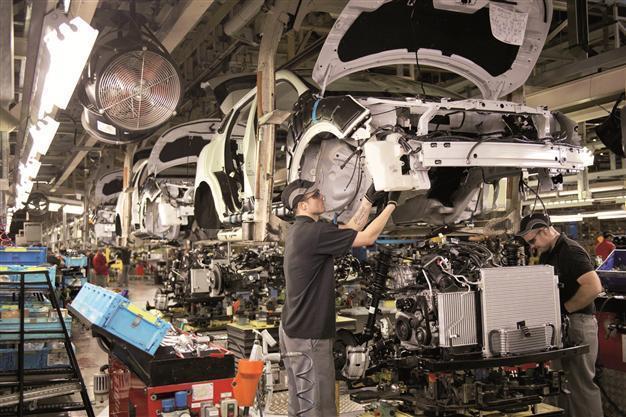Turkey’s manufacturing PMI eases, employment improves
ISTANBUL – Doğan News Agency

Turkey’s manufacturing upturn slowed in December, although input price inflation eased to a 19-month low on the back of falling oil prices and employment growth for goods producers hit a 3-year high.
Turkey’s manufacturing upturn was sustained in the final month of 2014, albeit at a weaker pace, according to the country's latest manufacturing project and manufacturing information (PMI) survey data.Output, new orders and purchases of inputs all rose more slowly since November, but employment growth for goods producers hit a three-year high.
The headline HSBC Turkey Manufacturing PMI was a composite single-figure indicator of manufacturing performance. It was derived from indicators for new orders, output, employment, suppliers’ delivery times and stocks of purchases, read the statement on Turkey Manufacturing PMI released by Markit.
The PMI had remained above the no-change mark of 50 for the fifth successive month in December, indicating a further overall improvement in manufacturing business conditions in Turkey, according to the data.
The PMI eased from November’s nine-month high of 52.2 to 51.4, indicating the slowest overall growth since September, remaining higher than its historic average of 51. The manufacturing sector’s performance over the fourth quarter as a whole was the strongest since the first quarter of 2014.
Consumer inflations still high
Commenting on the Turkey Manufacturing PMI survey, Melis Metiner, Chief Economist at HSBC Turkey said, “Manufacturing conditions remained broadly favorable in December. Output, new orders and new export orders all rose, but the pace of output growth was slower compared to November.”
“Price pressures continued to moderate. The rate of output price inflation was the lowest since August 2012. The sharp fall in oil prices is pushing down output price inflation, which, in turn, should translate into lower consumer inflation. As of November, annual consumer inflation in Turkey is still high at 9.2 percent, but it is likely to fall sharply in the first half of 2015, on the back of lower energy prices, a more stable currency and lower food inflation compared to 2014,” he added.
Turkish manufacturers had seen their intakes of new work increase for the fourth consecutive month in December, which led the rate of expansion to ease from November’s nine-month high, to only a marginal pace. Meanwhile, new export order growth remained fractional.
Growth rate eased
Overall growth of new orders supported production in December, which rose for the fifth successive month. The rate of growth eased from November’s nine-month high to a moderate pace that was broadly in line with the long-run survey average that has been projected since mid-2005. Employment remained bright in the December survey.
The manufacturing workforce expanded for the 67th consecutive month and at the fastest rate in three years. Recruitment was linked to both current requirements and new projects. Higher employment helped firms to cut backlogs for the ninth time in the past 10 months.
Input price inflation slowed for the third successive month in December, to the weakest since May 2013. A number of survey respondents linked lower cost pressures to falling oil prices, although there were reports that the stronger U.S. dollar exchange rate had contributed to higher import prices.
The volume of inputs purchased rose for the fifth month running but, as with output and new orders, at a weaker rate than in November. Meanwhile, prices charged for Turkish manufactured goods were broadly unchanged over the month, linked by firms to competitive pressures.
China also reported its official PMI slipped to 50.1 in December, the lowest level of 2014 and barely in expansion territory. That blow was softened by a rise in the service sector PMI to 54.1.
















